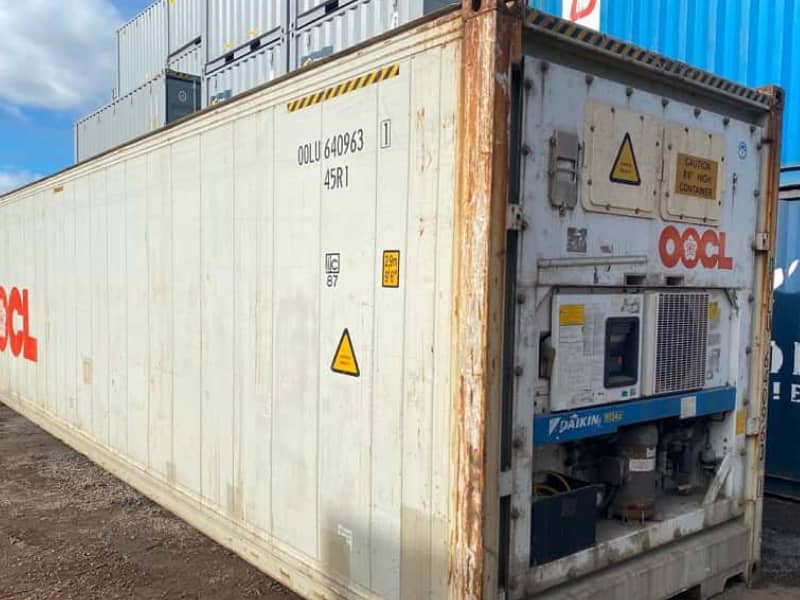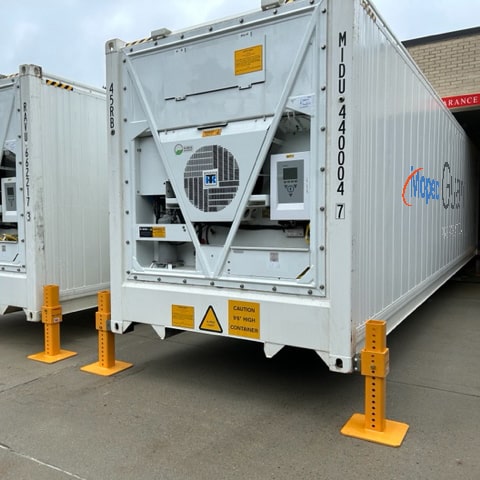Choose Used 40 Ft High Cube Refrigerated Containers for spacious cold storage capacity
Everything About Cold Storage Space Containers: Essential Insights for Your Storage Requirements
Cold storage containers play an essential duty in the conservation of subject to spoiling items. They come in various types, including chilled and shielded devices, each made for details storage demands. Recognizing the benefits and crucial functions of these containers is important for businesses intending to maximize their operations. As the demand for reliable storage services expands, checking out the various options available can cause informed decisions that impact both success and sustainability. What elements should one think about when picking the best container?
Kinds of Cold Storage Containers
Cold storage space containers come in different kinds, each designed to meet details temperature control demands. Amongst the most common types are cooled containers, which maintain temperatures between 0 ° C to 10 ° C, making them suitable for perishable items like fruits, veggies, and milk products. Another kind is the deep freezer container, which operates at temperatures below -18 ° C, perfect for lasting storage of icy things such as meats and seafood.
Insulated containers supply temperature stability without energetic air conditioning, making them useful for short-term transport of temperature-sensitive products. In addition, there are portable cold storage space units, which use versatility in places and are usually used in events or seasonal procedures. Blast refrigerators rapidly decrease the temperature level of warm foods, making certain safety and security and quality. Each type serves a special objective in different sectors, from food service to drugs, emphasizing the relevance of selecting the ideal container for details storage demands.

Advantages of Making Use Of Cold Store Solutions

In addition, freezer solutions prolong the shelf life of products, decreasing waste and raising profitability for companies. By efficiently taking care of supply with appropriate temperature control, companies can enhance their supply chains and enhance operational effectiveness.
Furthermore, cold storage space facilities permit versatile storage space choices, suiting numerous volume requirements and seasonal fluctuations sought after (used 40ft refrigerated shipping containers). This adaptability assists businesses react swiftly to market changes
Utilizing chilly storage space options can guarantee compliance with health and safety and security regulations, guarding both consumers and businesses. Overall, the tactical use cold storage improves product administration while advertising sustainability and economic practicality.
Secret Features to Try To Find in Cold Storage Containers
When selecting cold storage containers, numerous vital features value mindful consideration to secure peak efficiency and reliability. Temperature control capabilities are important; containers must preserve constant temperatures ideal for specific items. Insulation quality additionally plays a considerable duty, as superior insulation lowers power usage and improves temperature stability.
Next, simplicity of accessibility and loading is critical; containers should offer straightforward styles for efficient handling and organization. Toughness is another crucial aspect; weather-resistant materials assure longevity and protect components versus ecological aspects.
In addition, mobility attributes, such as built-in wheels or raising points, facilitate transport, while adjustable designs enable tailored storage space solutions.
Lastly, keeping an eye on systems, including temperature alarms and remote tracking, supply real-time updates, ensuring that problems remain excellent. By focusing on these attributes, customers can choose cool storage space containers that meet their operational needs properly.
Picking the Right Cold Store Container for Your Requirements
Picking the ideal freezer container calls for a thoughtful assessment of functional demands and specific needs. Aspects such as the sort of products being stored, temperature sensitivity, and quantity needs to be focused on. For circumstances, perishable food products might require containers with strict temperature controls, while pharmaceuticals might need accurate problems to keep effectiveness.
In addition, potential individuals should think about the container's size and wheelchair. A bigger unit might be needed for mass storage space, while smaller, mobile alternatives can be excellent for on-site or momentary requirements. Insulation quality and energy effectiveness are also critical, as these will impact functional costs and temperature level security.
Conformity with industry policies and criteria is vital, particularly in sectors like food and health care. By carefully assessing these aspects, individuals can select a cold store container that properly meets their distinct demands and warranties ideal storage problems.
Best Practices for Preserving Cold Store Issues
Maintaining suitable cold store conditions is essential for protecting the quality and safety and security of temperature-sensitive items. Routinely keeping track of temperature and humidity levels is important; using reliable digital thermostats and hygrometers can offer exact analyses. In addition, next page correct insulation of cold storage space containers helps reduce temperature variations and power loss.
Executing a first-in, first-out (FIFO) system ensures that older supply is used before newer stock, lowering waste (used 40ft refrigerated shipping containers). Additionally, preserving an organized layout within the storage area enables better air movement and lessens the threat of cross-contamination
Routine maintenance examine tools, such as seals and compressors, are very important to stop malfunctions. Staff training on finest practices for packing and discharging products helps keep temperature level integrity. Maintaining doors closed as much as feasible restrictions warm exchange, guaranteeing that the chilly storage space atmosphere stays secure and reliable in maintaining useful items.
Price Considerations for Cold Store Solutions
When assessing freezer options, it is crucial to consider the preliminary financial investment expenses together with continuous operational expenses. A detailed failure of these prices can expose considerable long-term financial savings capacity for services. Understanding these economic elements assists stakeholders make informed decisions regarding their cold storage space demands.

Preliminary Financial Investment Prices
The economic landscape of freezer containers presents different first investment prices that businesses must think about. These expenses commonly consist of the purchase or rental cost of the containers, which can vary based on size, type, and insulation quality. In addition, expenses connected to retrofitting existing structures to suit chilly storage space should be factored in, particularly if specialized tools is needed. Installment prices, consisting of electrical work and refrigeration systems, likewise contribute to the overall first financial investment. Businesses ought to not ignore transport expenses for supplying containers to their desired place. Finally, potential customization options, such as shelving or temperature level surveillance systems, can even more impact the first financial investment. Careful budgeting for these factors is important for effective freezer application.
Operational Expenses Breakdown
Functional costs for freezer services encompass a number of crucial cost factors to consider that businesses should browse. Secret elements consist of power prices, which can be substantial due to the demand to preserve low temperature levels. Upkeep expenses are also substantial, as regular maintenance is vital to assure tools runs successfully and continues to be compliant with health and wellness requirements. In addition, labor costs might develop from the demand for specialized staff to check the storage space and take care of environment. Insurance policy expenditures are one more factor to consider, as companies need to safeguard their financial investments against potential losses. Ultimately, any prospective governing conformity costs need to be factored in, as businesses might need to spend in systems that stick to food security and environmental laws. Comprehending these costs is critical for effective budgeting.
Long-Term Financial Savings Possible
Purchasing freezer solutions offers significant long-lasting cost savings possibility, transforming initial expenses into economic performance in time. By lessening putridity and waste, organizations can enhance their profit margins considerably. Advanced insulation and energy-efficient systems decrease energy expenses, which accumulate over the lifespan of the devices. Cool storage containers usually require much less frequent upkeep compared to standard refrigeration methods, leading to lower repair expenses. The capability to shop products for extended periods without endangering high quality enables organizations to maximize market fluctuations, optimizing revenue. In addition, the scalability of cold storage space solutions makes it possible for business to adjust to transforming demands without incurring extreme prices. Generally, these aspects add to an engaging instance for freezer as a cost-efficient financial investment look at these guys method.
Frequently Asked Inquiries
How Much Time Can Food Be Saved in Freezer Containers?
The period food can be stored in freezer containers varies by kind. Normally, subject to spoiling items last from days to weeks, while icy foods can remain risk-free for months, relying on proper temperature level and storage conditions.
Are Freezer Containers Energy-saving?
The power effectiveness of cold storage containers varies based upon layout and insulation high quality. Modern units typically use innovative modern technology to minimize energy consumption, ultimately contributing to lowered operational prices and ecological influence in long-lasting usage.
Can Cold Store Containers Be Custom-made for Certain Demands?
Cold storage containers can certainly be personalized to fulfill details needs. Adjustments might include temperature controls, dimension changes, and extra attributes, enabling individuals to tailor services properly for various storage needs and functional choices.
What Are the Typical Dimensions of Cold Store Containers?
Cold storage space containers normally are available in typical sizes look at this site such as 10, 20, and 40 feet. These measurements accommodate various storage needs, making sure adaptability for companies needing temperature-controlled settings for perishable goods or sensitive materials.
Do Cold Storage Containers Require Unique Permits for Usage?
Cold store containers often require special permits for use, depending on local policies and meant applications. Authorities may mandate authorizations to ensure safety and security standards, environmental compliance, and correct functional practices are preserved during their use.
Cold storage space containers come in numerous kinds, each created to satisfy particular temperature level control demands. Furthermore, chilly storage space centers allow for versatile storage alternatives, fitting numerous volume needs and seasonal variations in need. Choosing the right cold storage container needs a thoughtful evaluation of operational needs and details requirements. The financial landscape of cold storage containers presents various first financial investment prices that organizations need to consider. Cold storage containers can indeed be personalized to satisfy certain demands.